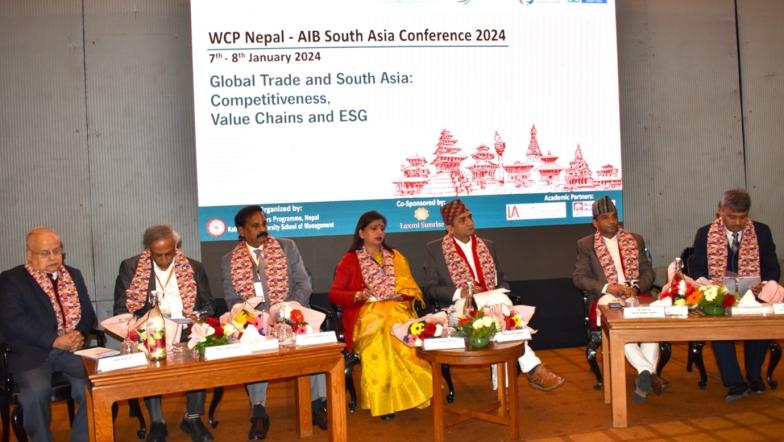WTO Chair in Nepal concludes summit on competitiveness, value chains and ESG

The WTO Chair in Nepal based at the Kathmandu University School of Management (KUSOM), organized a conference on 7-8 December with a focus on trade competitiveness, value chains and Environmental, Social, and corporate Governance (ESG). The event was organized in collaboration with the South Asia Chapter of the Academy of International Business (AIB), a leading association of scholars in the field of International Business in South Asia. The event brought together academics and policymakers from the region to explore synergies for enhancing trade competitiveness within the framework of evolving value chains and ESG considerations.
Speaking at the opening ceremony, WTO Deputy Director-General Xiangchen Zhangstated that strengthening regional economic integration and value chains is key for ensuring resilient economic systems in the region. However, the pursuit of increased competitiveness must not compromise sustainable practices, especially considering the region's vulnerability to climate change. DDG Zhang stressed the importance of harmonizing trade competitiveness with ecologically sustainable solutions especially for climate-vulnerable countries like Nepal.
The event was also attended by Mr. Narayan Prasad Sharma Duwadee, the Secretary of Nepal's Ministry of Industry, Commerce, and Supplies (MoICS), Dr. Toya Narayan Gyawali, Member Secretary of the National Planning Commission, Mr. Chandra Kumar Ghimire, Former Secretary of MOICS, and Mr. Manoj Paudel, Executive Committee Member and Chairperson of Nepal Investment and International Affairs Forum at the Federation of Nepalese Chambers of Commerce and Industry.
Mr. Narayan Prasad Sharma Duwadee, Secretary of Nepal’s Ministry of Industry, Commerce and Supplies, remarked, “Addressing policy gaps in international trade demands collaborative efforts from policymakers and academics alike. I am confident that the Chair’s research findings will serve as valuable resource for formulating appropriate government policies.” He further expressed that the Ministry was eager for feedback on what steps the government should take to improve competitiveness of its businesses.
Ambassador Ram Prasad Subedi, Nepal’s Ambassador to Switzerland said, “Trade issues are becoming increasingly complex, and the region will need to adapt to ensure increased productive capacity of their economies. This will also require adoption of new technologies and tapping into new markets for improved competitiveness.” He further added, “I am hopeful that the WTO Chairs programme will continue to support capacity building of institutions in the region and contribute to this effort.”
The conference provided a platform for regional academics to present their research papers and validate their findings on diverse issues such as international business and trade, reverse innovation, regional economic integration, and circular and digital economy, among others.The findings provided an insight on the evolving needs of emerging markets and presented ways to foster a more resilient and inclusive economic landscape.
The WTO Chairs in India and China — Prof. James Nedumpara from the Indian Institute of Foreign Trade and Prof. Xinqyan Tu from the University of International Business and Economics — took part in the conference as key discussants. They also contributed to a regional meeting of WCP Chairs from Asia discussing joint projects through which the Asian Chairs could make meaningful contributions to the upcoming ministerial conference (MC13).





